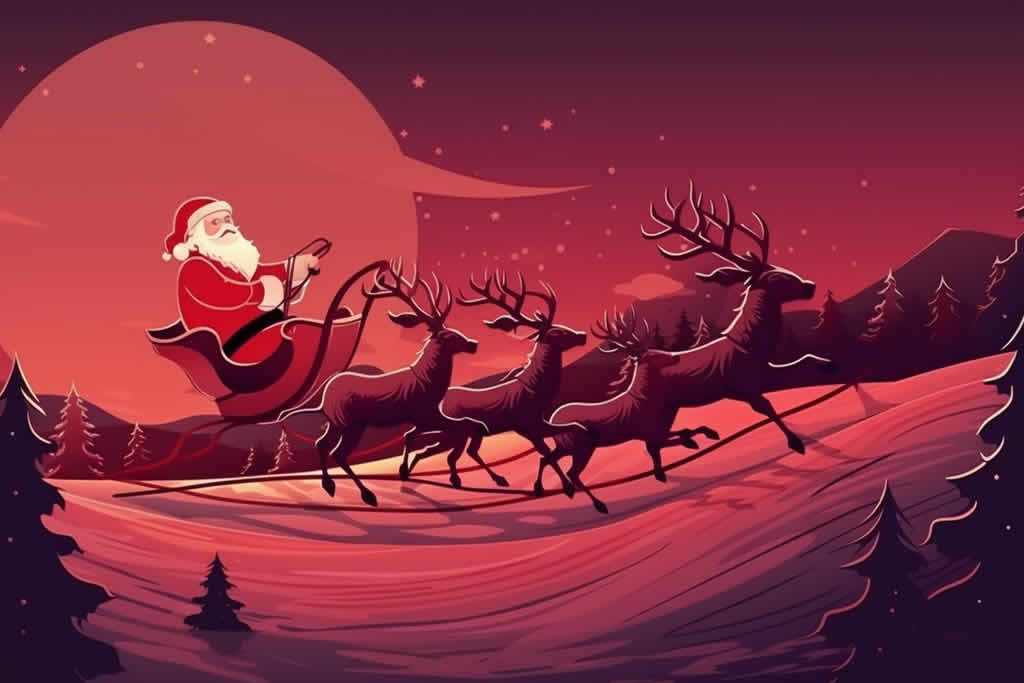Christmas Day is one of the most popular holidays in the world. It is celebrated on December 25th every year, commemorating the birth of Jesus Christ.
Over time, Christmas has also become a secular holiday celebrated by people of different religions and cultures.
This article will explore Christmas Day’s history, traditions, and celebrations.
The History of Christmas
So, let’s dive into the history of Christmas. Why do we celebrate it, and where did it all begin? It’s time to uncover the roots of this holiday that brings us so much joy.
Origins of the Holiday
Christmas, as you might know, is a Christian holiday. It celebrates the birth of Jesus Christ, the central figure in Christianity. But did you know that the date of Jesus’ birth wasn’t actually known for sure? Early Christians didn’t celebrate it like we do today. In the 4th century, the church decided to set December 25th as Jesus’ birthday, partly to coincide with some popular pagan festivals. This decision helped the church spread Christianity to more people, as the new holiday borrowed some customs from the existing festivals.
Incorporation of Pagan Customs
You might be wondering how pagan customs got mixed up with Christmas. Before Christianity took hold, many European cultures celebrated winter solstice festivals. These festivities were filled with feasting, gift-giving, and other fun activities. As Christianity spread, the church wanted to make it easier for people to accept their new religion. So, they adopted some of the pagan customs into their own celebrations, giving birth to the holiday we now know as Christmas.
For example, the Roman festival of Saturnalia was a time of gift-giving, feasting, and general merrymaking. The church thought incorporating these customs into their new holiday could make Christianity more appealing to the pagans. As a result, we can see the influence of these ancient traditions in our modern Christmas celebrations.
Evolution of Christmas Traditions
Over time, Christmas evolved, and new customs were added. Let’s take a look at some of the most well-known Christmas traditions and how they came to be.
The ancient Romans and Egyptians used Evergreens as decorations during winter solstice festivals. They believed that evergreen plants symbolized eternal life and hoped for the return of spring. In the Middle Ages, Germans started bringing evergreen trees into their homes and decorating them with candles and fruits, which eventually gave rise to the modern Christmas tree.
Another popular Christmas custom, the exchange of gifts, can also be traced back to pagan festivals. During Saturnalia, Romans would exchange gifts with one another. Early Christians later adopted this tradition and incorporated it into their Christmas celebrations.
Christmas carols, the songs we all love to sing during the holiday season, have been around since medieval times. They were originally sung in Latin, but as time went on, they were translated into local languages. This made them more accessible to ordinary people, and their popularity grew. Today, carols are sung in many languages and have become essential to Christmas celebrations worldwide.
As you can see, Christmas has come a long way from its early beginnings. The holiday has incorporated elements from different cultures and traditions and continues to evolve even today. But, no matter how much it changes, one thing remains constant: the spirit of love, joy, and togetherness that it brings to people around the world.
So, next time you’re gathered around the tree with your family, singing carols and exchanging gifts, take a moment to remember the fascinating history of Christmas. It’s a story that spans centuries, cultures, and continents, and it’s one that’s still being written today. Remember that as you enjoy the holiday season, make your own memories with the people you love.
And with that, you now know more about the history of Christmas. In the next sections, we’ll explore modern Christmas celebrations, the different foods enjoyed during the holiday, and how people around the world celebrate this special time of year. So, stay tuned and get ready to learn even more about this beloved holiday.
Modern Christmas Celebrations
Christmas Decorations
When it comes to Christmas, we all love to deck the halls and make our homes look festive. We put up twinkling lights, colorful ornaments, and other cheerful decorations to brighten up the dark winter days. The tradition of decorating our homes for Christmas goes back centuries and has its roots in the use of evergreen branches and plants during winter solstice festivals.
Nowadays, we’ve expanded our Christmas decorations to include not just Christmas trees but also wreaths, garlands, and stockings. We even adorn our homes with outdoor lights and displays to share the holiday spirit with our neighbors and friends.
Christmas Songs and Carols
What would Christmas be without the music? Christmas songs and carols are a huge part of the holiday season. They create a warm and festive atmosphere and bring people together in a spirit of joy and unity. From timeless classics like “Silent Night” and “Deck the Halls” to modern favorites like “Last Christmas” and “Feliz Navidad,” there’s a Christmas tune for everyone.
Caroling is another fun tradition that involves groups of people going from house to house, singing Christmas songs to spread cheer. This custom dates back to medieval times and is still enjoyed by many people today.
Santa Claus and Christmas Gifts
No discussion of Christmas would be complete without mentioning the jolly old man himself, Santa Claus. Santa is based on the Dutch legend of Sinterklaas, which was brought to America by Dutch settlers. He’s known for bringing gifts to children all around the world on Christmas Eve, making the holiday extra special for kids everywhere.
Gift-giving is an essential part of Christmas, with roots in ancient Roman festivals. Today, we exchange presents with our loved ones as a way to show our love and appreciation for them. It’s a time to make others happy and enjoy the satisfaction that comes from giving.
Christmas Foods
Traditional Christmas Dinner
Christmas is a time for feasting, and food plays a central role in our celebrations. In the United States, a traditional Christmas dinner might include roast turkey or ham, stuffing, mashed potatoes, and cranberry sauce. In the United Kingdom, they often serve roast beef or goose instead. The specifics of a Christmas meal can vary from family to family and country to country, but the common theme is gathering together with loved ones to share a delicious meal.
Desserts and Treats
Christmas isn’t complete without an array of sweet treats to indulge in. Cookies, pies, and cakes are all popular choices for satisfying our sweet tooth during the holiday season. Some classic Christmas desserts include gingerbread cookies, fruitcakes, and mince pies. These tasty treats add an extra touch of sweetness to our holiday celebrations.
Global Christmas Celebrations
Christmas in Europe
European Christmas traditions are incredibly diverse, with each country having its own unique customs. In Germany, for example, people celebrate with Christmas markets and the festive treats they offer. In Spain, the Feast of the Immaculate Conception marks the beginning of the Christmas season, while in Italy, the Feast of the Epiphany is a significant celebration.
Christmas in the Americas
In the Americas, Christmas traditions are a mix of European, indigenous, and African influences. People celebrate in the United States and Canada with festive decorations, gift-giving, and family gatherings. In Mexico and other parts of Latin America, the holiday season includes Las Posadas, a reenactment of Mary and Joseph’s search for shelter.
Christmas in Asia and Australia
In Asia and Australia, Christmas celebrations can vary greatly. Christmas is an important religious holiday in countries with a Christian population, such as the Philippines and South Korea. In Australia, where Christmas falls during summer, people often celebrate with outdoor barbecues and beach outings.
The True Meaning of Christmas
While we all love the festive decorations, gifts, and delicious food that come with Christmas, it’s essential to remember the true meaning of the holiday. At its core, Christmas is a time for love, joy, and togetherness. It’s an opportunity to spend quality time with family and friends, share our blessings, and create cherished memories.
Regardless of our backgrounds or beliefs, the spirit of Christmas can bring us together and remind us of the importance of kindness, compassion, and connection.
Additional Christmas Customs and Traditions
Now that we’ve covered the history, meaning, and various celebrations of Christmas around the world, let’s take a look at some other interesting customs and traditions associated with this joyful holiday.
Christmas Cards
Sending Christmas cards to friends and family is a popular tradition that dates back to the 19th century. The first Christmas card was created in 1843 by Sir Henry Cole and John Callcott Horsley in England. Since then, the practice of exchanging cards during the holiday season has become widespread, allowing people to share their warm wishes and maintain connections with loved ones near and far.
Advent Calendars
The Advent calendar is another beloved Christmas tradition, especially among children. It’s a special calendar to count down the days until Christmas, starting from December 1st. Each day, a door on the calendar is opened to reveal a small treat or surprise, like a piece of chocolate or a tiny toy. This custom originated in Germany in the 19th century and has since become popular worldwide.
Christmas Movies
Who doesn’t love curling up on the couch with a cozy blanket and a classic Christmas movie? Watching holiday films is a cherished tradition for many families, providing an opportunity to bond and get into the Christmas spirit. From timeless classics like “It’s a Wonderful Life” and “A Christmas Carol” to modern favorites like “Elf” and “The Polar Express,” there’s a Christmas movie for every taste.
Boxing Day
Boxing Day celebrated on December 26th, is another holiday closely linked to Christmas. It originated in the United Kingdom and is still observed in countries that are part of the British Commonwealth. Traditionally, it was a day when employers would give their workers gifts or “Christmas boxes” as a token of appreciation. Nowadays, Boxing Day is a public holiday, often marked by shopping sales, sports events, and time spent with family and friends.
Christmas Superstitions and Folklore
Throughout history, Christmas has also been associated with various superstitions and folklore. For example, some people believe that bringing a sprig of holly into the home during the holiday season can protect the household from evil spirits. Another popular belief is that animals can speak on Christmas Eve, a magical night when the ordinary rules of the world are suspended.
As we can see, Christmas is a rich and multifaceted holiday with a fascinating history and an array of customs and traditions that have developed over time. Whether you’re feasting with family, singing carols, or simply enjoying the warmth and joy of the season, remember that Christmas is a time for love, unity, and togetherness. So, go ahead and make the most of this special time of year, and treasure the memories you create with the people you hold dear.
From its humble beginnings as a Christian holiday to the global celebration it is today, Christmas has evolved into a time of love, joy, and unity. The customs and traditions surrounding this special day are as diverse as those who celebrate it. So, as you enjoy your Christmas celebrations, please take a moment to appreciate the rich history behind them and the countless ways people come together during this magical season.
More Questions:
When was Christmas first celebrated?
Christmas was first celebrated on December 25th in the 4th century as a Christian holiday commemorating the birth of Jesus Christ.
Why are pagan customs incorporated into Christmas?
Early Christians adopted pagan customs into their Christmas celebrations to make the holiday more appealing to non-believers and help spread Christianity.
What is the origin of the Christmas tree?
The Christmas tree originated in Germany in the Middle Ages, where people brought evergreen trees into their homes and decorated them with candles and fruits.
Why do we give gifts at Christmas?
The tradition of gift-giving at Christmas dates back to the Roman festival of Saturnalia and was later incorporated into Christian celebrations.
How do Christmas celebrations differ around the world?
Christmas celebrations differ globally due to diverse cultural influences, local customs, and regional traditions. This can include variations in food, decorations, and holiday events.



